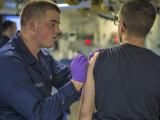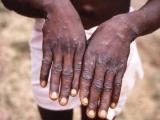Dec 9, 2002 (CIDRAP News) – Most people who took the opportunity to comment on a federal government proposal to test the smallpox vaccine in young children feel it's not a good idea.
Several hundred comments submitted in response to the proposal are available on a Department of Health and Human Services (HHS) Web site, and it appears that most of them oppose the trial.
When asked if it is true that the comments were mostly negative, Pat El-Hinnawy, a spokeswoman for the Office of Human Research Protections in the HHS Office for Public Health and Science, said, "I think that's a fair assessment."
The 30-day public comment period for the proposed trial ended Dec 2. El-Hinnawy said the public comments, along with comments from 10 nonfederal experts and the results of an internal review, will be presented to Health and Human Services Secretary Tommy Thompson, who will decide whether the trial should go forward. She said she didn't know how soon the material would go to Thompson.
The National Institutes of Health (NIH) is proposing to test the decades-old Dryvax vaccine in standard and diluted concentrations in 40 children aged 2 to 5 years. The agency invited public comments when it published a notice of the proposal in the Oct 31 Federal Register and posted the study protocol and several other documents on the Office of Human Research Protections Web site.
The aims of the proposed study include testing whether the vaccine is safe and immunogenic and whether semipermeable dressings can keep vaccinia virus from spreading to other parts of the body and to other people. Harbor-UCLA Medical Center in Los Angeles and Cincinnati Children's Hospital would conduct the research.
A staff member in the Dockets Management Branch of the Food and Drug Administration (FDA) said the FDA collected a total of 770 comments on the plan. Those included 478 submitted on an FDA electronic form, 246 by e-mail, and 46 by regular mail.
As of today, 351 electronically submitted comments appear on the FDA Web site for the trial, and they seem to be heavily, though not unanimously, negative.
For example, one man stated, "Smallpox threats are greatly overstated. To begin clinical trials in small children without any illness is ridiculous. I would never approve this for my child."
Likewise, a woman who identified herself as a health professional called the trial "very inappropriate" because the information is not essential and the risk to the children would not be small. She stated, "We have enough knowledge now of what we would need to do to control smallpox disease if cases of smallpox were present in a community: Those children who had been exposed to the disease would need vaccination no matter the result of a trial such as this; and it would not be necessary for children in the general community to be vaccinated unless they had been exposed to the disease."
However, another health professional wrote that it would be unethical not to test the vaccine in children, because the "rejuvenated" vaccine may have different reactogenicity and immunogenicity than vaccines used in the past. "The studies in adults are reassuring but demonstrate a significant degree of reactivity," he wrote. "In order to anticipate and prepare for this in children, only a research protocol trial would provide appropriate information."
El-Hinnawy noted that the panel of 10 nongovernmental experts consulted by HHS all felt that the proposed study could be approved under existing regulations for protecting children. "They all said yes with varying degrees of comments and stipulations," she said.



















